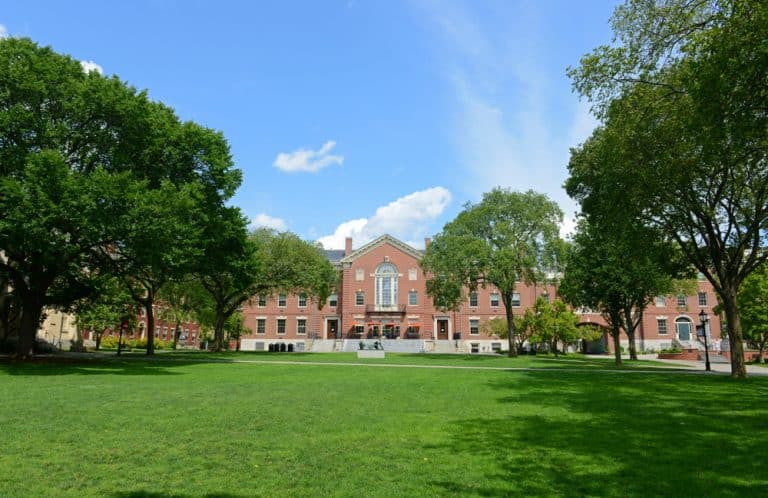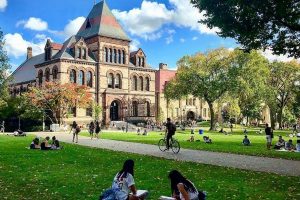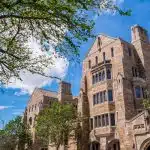Brown University, located in Providence, Rhode Island, is renowned as an Ivy League research institution with a strong emphasis on science, particularly in medicine, mathematics, and computer sciences. It’s also known for having the most unique courses at Brown being offered to students.
Brown distinguishes itself with an open academic curriculum designed to improve skill development and encourage intellectual risk-taking. It nurtures students to become entrepreneurial problem-solvers and creative thinkers.
In this blog, we’ll be sharing insights on the most unique courses at Brown, as well as insights on the college life in this Ivy League school.
- What Are the Most Unique Courses at Brown?
- What Is Brown’s Open Curriculum All About?
- What Is Brown University Known for Academically?
- What Are the Top Degree Programs at Brown University?
- Frequently Asked Questions
- Takeaways
What Are the Most Unique Courses at Brown?
Brown University offers almost 2,500 courses across over 80 undergraduate and 84 graduate programs. Here are some of the most unique classes you can take in Brown:
1. ANTH 1030 – Pre-Columbian Art and Architecture: A World That Matters
You will get an overview of the ancient art and architecture of ancient America in this lesson, with a particular emphasis on Mexico, Central America, and the Andes.
In this course, you will also investigate topics such as:
- the universe
- monarchy
- stories and symbols
- empires
- regal courts
You will also have the opportunity to examine and discuss artifacts from various institutions.
2. ARCH 0310 – Interactions with the Dead: Past and Present
Confront the reality: everyone passes away in the end. It is unavoidable, and there is no way to avoid it. However, there are instances when the living is closer to the deceased than they would like to be.
In this course, this proximity will be investigated by examining the relationships between the living and the dead in various settings, including:
- religion
- culture
- business
- law
- ethics
As one of the best courses at Brown, you will examine the variety of responses people have had to mortality and the presence of dead bodies in this course by looking at instances from both the ancient world and the contemporary world.
3. BIOL 1920D – Race, Difference and Biomedical Research: Historical Considerations
Have you ever given any consideration to how history, culture, and racial issues intersect with breakthroughs in biomedical research? This class will be a real delight for you if you’re looking for some observations on the subject matter.
What kinds of scientific inquiries do people ask? How do they organize research studies? How do they understand the results of those studies?
In what ways throughout history have the practices and theories of biological science and technology contributed to people’s understanding of “race” and the differences between races?
How does racial identity intersect with gender and social class? What are the consequences of this argument for understanding the health disparities that exist?
This class will cover a range of topics, including the history of science and technology and biological science.
4. CLAS 0400 – Ancient Comedy and its Influence
This course investigates the beginnings of comedy, its development in ancient Greece, Rome, and England, and the continuing influence of these countries’ comedic traditions.
Brown’s Department of Classics has a long and distinguished history, dating back to the university’s founding. The department offers a wide range of courses that contribute to a broad liberal education while also providing specialized training for students planning to pursue graduate studies.
Each semester, the department offers various courses that require no prior knowledge of ancient languages, covering topics in literature, mythology, history, philosophy, and religion.
5. GEOL 2920C – The Sedimentary Rock Cycle of Mars and Earth
This course arrives in your life just when you believe you can’t possibly be any more clueless about living on Mars, and it proves you wrong. The sedimentary rock cycle on Mars will be the topic of conversation in this course.
How can the account of changes in Mars’ sedimentary rocks help people better comprehend the planet’s history? You will get to look at some really interesting satellite photographs of Mars, and by the end of the semester, you will have a significant amount of knowledge regarding rocks.
6. AFRI 1100B – The Caribbean: Cultures, Politics, Histories, and Literature
The islands that make up the Caribbean are not only connected by geography, but they also have a history that is deeply connected with that of enslavement and colonization.
As one of the best courses at Brown, you will have the opportunity to delve into substantial interdisciplinary (social science and literary) works that seek to evaluate, reveal, and deconstruct forces that continue to influence the Caribbean region in this course.
7. SOC 2360 – Fertility
This course will serve as an introduction to the field of research focusing on the societal factors that influence human reproduction.
In this course, you will investigate various historical and social theories that attempt to explain reproduction’s role in decision-making concerning gender, the workplace, and public policy.
8. INTL 1803K – Media Wars: The Middle East
Compared to other regions of the globe in this day and age, the Middle East has garnered a disproportionate amount of attention in the news and on social media in both the United States and Europe over the past fourteen years.
Some of those forms of media shed light on particular facets of the societies and cultures of the Middle East; however, other forms of media have further simplified the region by reducing it to clichés and generalizations.
In this class, you will explore these topics through various media:
- ISIS
- the generation of news in the United States
- television
- digital media
- cyberterrorism
- religion
- music
9. SCSO 1700P – Neuroethics
You will investigate the ethical, social, and psychological implications of recent advancements in the neurosciences through the course of this study.
You will also learn about strategies and technologies for enhancing human traits; technologies that can “read” people’s minds, agency, and autonomy; and neuroscientific and evolutionary models of religious belief and moral judgment.
10. CHEM 0090 – Kitchen Chemistry
Have you ever wondered how your very own kitchen can also serve as a laboratory? You will investigate a variety of subjects, some of which include:
- artificial sweeteners
- trans fats
- baking soda as a leavening agent in baking
- the chemical foundation for the ripening of produce
- pectin as a cellular glue
In addition to that, you will take part in “edible experimentation.” You will learn in this class that cooking is both an art and a science.
Brown University provides a variety of educational opportunities that dive into fascinating discoveries. Enroll in some of these most unique courses at Brown if you want to force yourself out of your comfort zone and investigate topics from other fields of study.
What Is Brown’s Open Curriculum All About?
The Open Curriculum at Brown University allows you to design a rigorous yet personalized degree program tailored to your interests, strengths, and goals, all while encouraging exploration and challenge.
For over 50 years, this approach—where you become the architect of your own education—has set Brown apart in the world of higher education in the US.
Key features of Brown’s Open Curriculum include:
- Flexibility to explore a wide range of fields without general core requirements
- A grading system without GPAs or class rankings
- The option to choose between letter grades or satisfactory/no credit for any course
- The opportunity to concentrate in broad, interdisciplinary fields rather than major in a specific subject
With nearly 80 concentrations across various academic departments and interdisciplinary areas, Brown offers extensive academic freedom. You can even design an independent concentration or pursue independent study for credit. Rooted in the liberal arts tradition, the Open Curriculum encourages students to distribute their courses across multiple fields and disciplines while focusing on an area of interest.
As you plan your way into the Open Curriculum, consider the College’s liberal learning goals and the core competencies you’ll develop through your liberal arts education. Look for courses with special designations, such as those emphasizing writing or exploring topics related to race, power, and privilege.
What Is Brown University Known for Academically?
Brown University’s education is anchored in its Open Curriculum, which gives students the freedom to shape their academic journey without being bound by a set core curriculum or subject distribution. To graduate, you need to:
- complete a concentration and its requirements
- finish at least 30 courses
- be enrolled for a minimum of eight semesters
- demonstrate competence in writing
This flexible approach allows students to explore a wide variety of subjects, even those that may not directly relate to their area of specialization. You can also design your own independent concentration with guidance and approval from faculty, rather than choosing from existing programs.
Brown is also renowned for its prestigious and highly competitive Program in Liberal Medical Education (PLME). This unique eight-year program combines undergraduate education with professional medical studies. Students spend the first four years earning either an AB or ScB degree, followed by four years of medical school to earn an MD.
Another notable offering is the Brown-RISD Dual Degree Program. Over five years, students attend both Brown University and the Rhode Island School of Design (RISD), exploring their academic and creative interests. They graduate with both an AB or ScB from Brown and a BFA from RISD.
To be considered for the Brown-RISD Dual Degree Program, students must apply to both Brown and RISD, as well as submit a separate application to the Dual Degree Program’s admissions committee.
What Are the Top Degree Programs at Brown University?
The following are the most popular degree programs at Brown:
Computer Science
Brown’s computer science program is one of its most popular offerings. The curriculum covers a wide range of topics, including:
- artificial intelligence
- distributed systems
- programming languages
- scientific visualization
- robotics
- security
The department has recently earned several prestigious awards, with notable faculty like Maurice Herlihy and Thomas Dean leading the way.
Professor Herlihy is a renowned computer scientist known for his work in multiprocessor synchronization, with his research cited over 33,500 times. Professor Dean specializes in computer science and cognitive and linguistic sciences, focusing on automated planning and control, computational biology, machine learning, neural modeling, and spatial and temporal reasoning.
Economics
Economics, econometrics, and quantitative economics are among the most sought-after degrees at Brown University. The curriculum explores:
- financial institutions
- economic policy
- government expenditures
- globalization
- intersection of health and welfare with economics
This coursework prepares students for careers in business, finance, government, or the nonprofit sector, and also serves as a strong foundation for those pursuing graduate studies in business or law.
Brown is home to The Orlando Bravo Center for Economic Research, established in 2019. The center offers innovative research, collaboration, and training for future economic scholars, offering research grants and fellowships to both faculty and students.
Biology
Brown’s Division of Biology and Medicine includes The Warren Alpert Medical School and a comprehensive biology program, along with 14 clinical departments affiliated with eight teaching hospitals in the Providence area.
The undergraduate biology curriculum covers key areas such as:
- organic chemistry
- foundations of living systems
- biochemistry
- genetics
- modern applications in cell and molecular biology
Students can also pursue interdisciplinary concentrations in areas like:
- applied mathematics
- computational biology
- biochemistry
- biophysics
- biomedical engineering
Brown is planning to build a new integrated life sciences building and laboratory in Providence, dedicated to cutting-edge research.
Frequently Asked Questions
1. How much does it cost to study at Brown?
The average tuition cost at Brown is $65,656. This excludes other fees covering food and housing, which is around $17,000.
2. What are the SAT and ACT ranges required at Brown?
The SAT range required at Brown is 1490-1580, and the ACT range is 34-36. Brown is no longer test-optional and has returned to its previous policy of requiring applicants to submit their standardized test scores.
3. What is a passing grade in college?
It’s usually a C or 2.5. The grading system is often based on a 4.0 scale in the US. An A is the highest grade, worth 4.0 points, while a failing grade is an F, worth 0.0 points. B, C, and D grades fall in between and are worth 3.0, 2.0, and 1.0 points, respectively.
4. What makes Brown unique?
Brown is known for its Open Curriculum which allows you to create your own specialized education journey throughout college—subject to minimum requirements. The goal of this program is to instill creativity and critical thinking in the students by having the freedom to take up liberal arts courses as much as they can. There are also courses at Brown proven to be unique and interesting like Neuroethics and Media Wars.
5. Should I go to Brown University?
If the open curriculum and liberal arts education of Brown sounds appealing to you—then you should definitely apply to Brown University.
Takeaways
- Brown University has a unique Open Curriculum designed to improve critical thinking and creativity among its students.
- The liberal arts education at Brown is top-notch, and the school offers a wide array of unique courses that you can choose from. Some of these courses are Race, Difference and Biomedical Research: Historical Considerations, Media Wars: The Middle East, and Kitchen Chemistry.
- Excited to apply to Brown? Don’t worry, we’re here to help. At AdmissionSight, we have more than ten years’ worth of experience in helping students enter into their dream school.

Eric Eng
About the author
Eric Eng, the Founder and CEO of AdmissionSight, graduated with a BA from Princeton University and has one of the highest track records in the industry of placing students into Ivy League schools and top 10 universities. He has been featured on the US News & World Report for his insights on college admissions.




















